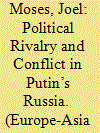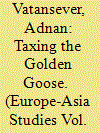| Srl | Item |
| 1 |
ID:
149365


|
|
|
|
|
| Summary/Abstract |
Why hasn’t the marked increase in women in politics over the last half century led to the expected results of increased gender equality and more democracy? In order to propose a new answer to this question, which is central for both theoretical and empirical feminist political science, I look at the case of Putin’s Russia as one of the authoritarian-leaning regimes that have promoted women into politics while simultaneously becoming more misogynist. Building on feminist institutionalism and the study of Russia’s regime dynamics, both of which are extending the study of informal institutions, I claim that women are being fast-tracked into politics informally, not just formally such as by party or legislative quotas. Yet these women are then boxed in by informal rules and by parallel institutions and posts, with virtually no opportunities to advocate for women’s interests. Putin’s regime has promoted women to be “stand ins” during times of crisis or change, “loyalists” and “showgirls” when the regime needs to showcase elections and representation, and “cleaners” when the appearance of corruption threatens the regime. Even demonstrations of ultimate loyalty have not protected those women who once advocated for feminist policies. This exercise in concept building suggests a framework for thinking about the importance and operation of informal institutions, sustained by gendered and homophobic rules, as a bulwark of male dominance that undermines women’s representation. There are also important policy implications, as advocates have been pushing for more women in politics to address a variety of ills that, my analysis suggests, will not be solved by numbers alone.
|
|
|
|
|
|
|
|
|
|
|
|
|
|
|
|
| 2 |
ID:
138571


|
|
|
|
|
| Summary/Abstract |
This is the strangest book of note I have ever read. And that’s as it should be, since the subject is Russia, the strangest country of note I have ever visited. Peter Pomerantsev has written the most bitter indictment of a nation’s politics and society going wrong since William Shirer’s 1941 Berlin Diary. Pomerantsev has also written a calm and incisive report on the current state of affairs in Russia. Yet it reads like a comedy of manners, a dark and grotesque comedy of manners, a State Department white paper co-authored by Evelyn Waugh and Franz Kafka. And not only that, but Nothing Is True is a bildungsroman, too.
|
|
|
|
|
|
|
|
|
|
|
|
|
|
|
|
| 3 |
ID:
155308


|
|
|
|
|
| Summary/Abstract |
The year 2015 throughout Russia was much less about what it seemed than what it revealed. On the surface, after the September 2015 combined regional and local elections, Russia appeared to be tranquil, politically disengaged, and supportive of President Vladimir Putin. The underlying reality was quite different. The election exposed a country divided by rivalry and a conflict of interests within the Russian political establishment set off by Putin’s own policies over the preceding two years. Since the election, Putin and the Kremlin have been confronting the challenge of balancing and containing the competing interests of institutions, levels of government, and establishment stakeholders who are less easily reconciled or controlled.
|
|
|
|
|
|
|
|
|
|
|
|
|
|
|
|
| 4 |
ID:
165337


|
|
|
|
|
| Summary/Abstract |
The beginning of Vladimir Putin’s third term was characterised by the politicisation of corruption. Opposition forces focused on corruption and criticised the regime for tolerating it. This article explores how the regime reacted to opposition criticism. The regime encountered a dilemma: it could not ignore the opposition but promoting anti-corruption reforms was risky for the regime. This study focuses on the regime’s use of the All-Russia People’s Front (Obshcherossiiskii Narodnyi Front—ONF) and concludes that it functioned as a ‘parastatal’ anti-corruption movement, enabling the regime to deflect the blame without directly involving itself in the process.
|
|
|
|
|
|
|
|
|
|
|
|
|
|
|
|
| 5 |
ID:
147949


|
|
|
|
|
| Summary/Abstract |
Survey evidence suggests that Vladimir Putin’s legitimacy rests on three pillars: domestic order; economic prosperity; and the demonstration of great power status internationally. This is problematic inasmuch as it is based on a high degree of personal popularity which inhibits and contravenes the legal–rational legitimacy of state institutions. This requires continued delivery in all three areas in order to maintain the legitimacy of the regime. This framework allows us better to interpret the 2014 Ukraine crisis as an attempt to shore up support in one ‘pillar’ as performance-based legitimacy recedes.
|
|
|
|
|
|
|
|
|
|
|
|
|
|
|
|
| 6 |
ID:
175444


|
|
|
|
|
| Summary/Abstract |
There has been one defining characteristic of Russia’s approach to taxing the oil sector during the Putin era. Successive governments have illustrated an inbuilt resistance to adopting a comprehensive tax regime that would take into account the sector’s costs and profitability. This has defied international trends among a growing number of oil-rich countries. This article centres on three explanations. The concentration of power around the executive branch, the organisational setup of the oil industry and ‘path dependence’ have all made Russia less likely to shift away from its adherence to more traditional means of taxation and ad hoc policy solutions.
|
|
|
|
|
|
|
|
|
|
|
|
|
|
|
|